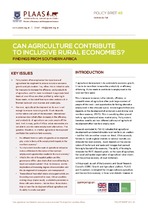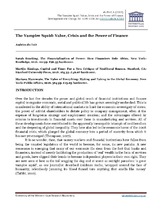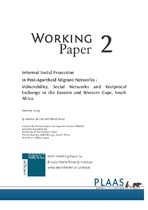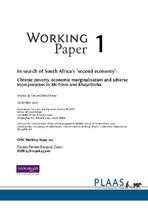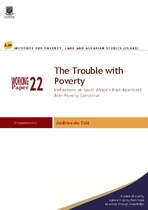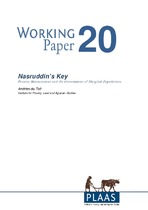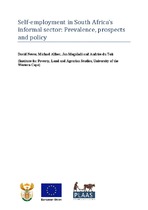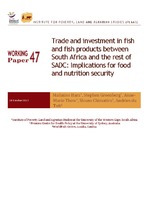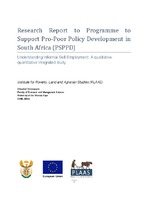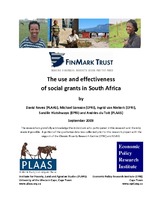Search
Now showing items 11-20 of 39
Can agriculture contribute to inclusive rural economies?
(Institute for Poverty, Land and Agrarian Studies, University of the Western Cape, 2015)
If agricultural development is to contribute to economic growth,
it has to do more than increase the productivity or efficiency
of farming. It also needs to contribute to employment in the
rural non-farm sector.
This ...
The vampire squid: Value, crisis and the power of finance
(Wiley, 2019)
Over the last five decades the power and global reach of financial institutions and finance capital to organize economic, social and political life has grown seemingly unchecked. This is manifested in the ability of ...
Informal social protection in post-apartheid migrant networks: Vulnerability, social networks and reciprocal exchange in the Eastern and Western Cape, South Africa
(Institute for Poverty, Land and Agrarian Studies, University of the Western Cape, 2009-01)
This paper considers the dynamics of informal social protection in the context of chronic poverty and vulnerability in post-apartheid migrant networks. It argues that in poor and marginalised households in South Africa, ...
In search of South Africa’s ‘second economy’: Chronic poverty, economic marginalisation and adverse incorporation in Mt Frere and Khayelitsha
(Institute for Poverty, Land and Agrarian Studies, University of the Western Cape, 2007-11)
Since 2003, South African policy discourse about persistent poverty has been
dominated by the notion that poor people stay poor because they are
trapped in a ‘second economy’, disconnected from the mainstream ‘First-
World ...
The trouble with poverty: Reflections on South Africa’s post-apartheid anti-poverty consensus
(Institute for Poverty, Land and Agrarian Studies, University of the Western Cape, 2012-09)
This paper considers the state of poverty discourse in South Africa since 1994: the ideological frameworks,
narratives and assumptions that have shaped the construction of poverty as an object of academic
knowledge, ...
Nasruddin’s key: Poverty measurement and the government of marginal populations
(Institute for Poverty, Land and Agrarian Studies, University of the Western Cape, 2011)
This paper considers the role of ‘measurement’ and other forms of poverty knowledge in a context where the nature and direction of global economic growth is creating ‘surplus populations’ suffering various forms of ...
Self-employment in South Africa’s informal sector: Prevalence, prospects and policy
(Institute for Poverty, Land and Agrarian Studies, University of the Western Cape, 2011)
This text describes research undertaken to investigate small-scale self-employment at the
margins of the South African economy. Despite high levels of poverty and unemployment
South Africa’s informal sector is, by ...
Trade and investment in fish and fish products between South Africa and the rest of SADC: Implications for food and nutrition security
(Institute for Poverty, Land and Agrarian Studies, University of the Western Cape, 2017-10)
This paper looks at the dynamics of intra-regional trade and investment in fish and fish
products between South Africa and the rest of the Southern Africa Development Community
(SADC) region, and the implications of this ...
Research Report to Programme to Support Pro-Poor Policy Development in South Africa (PSPPD)
(Institute for Poverty, Land and Agrarian Studies, University of the Western Cape, 2011)
This report documents research conducted on small-scale informal self-employment at the margins of the
South African economy. Despite high levels of poverty and unemployment South Africa has, by
developing country ...
The use and effectiveness of social grants in South Africa
(Institute for Poverty, Land and Agrarian Studies, University of the Western Cape, 2009)
This research examines the effectiveness of social grants in South Africa, and how recipients use
their grants. As a form of social protection, social grants not only ameliorate poverty and
provide a safety net, they ...

